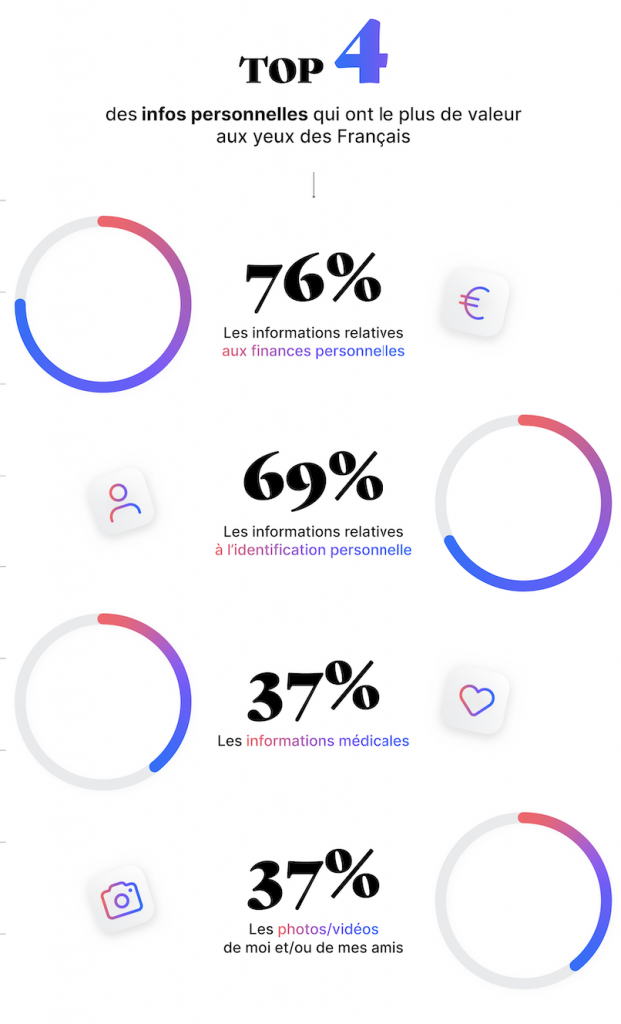


Qwant, Proton, Olvid and Murena joined forces in January 2023 to study the behaviour of French people with regard to their online privacy The French […]
Qwant, Proton, Olvid and Murena joined forces in January 2023 to study the behaviour of French people with regard to their online privacy
The French are concerned about the use of their personal data but place little value on the least tangible data.
Internet users are aware of sharing data when they are online: 92% of them say they are concerned by the subject and 72% are aware of disclosing personal information when browsing the Internet.
This awareness can certainly be explained by the strong news around the protection of personal data, placing the subject at the heart of societal issues: requests for consent are clearly visible during browsing, since the implementation of the General Data Protection Regulation (GDPR), the GAFA are penalized with record fines for collection or misuse of personal data, the authorities are starting to limit the use of digital giants’ tools, particularly in schools, and the implementation of the European Digital Market Act is progressing, to create a more level playing field, among other things on the search engine and browser market, and to preserve the freedom of choice of Internet users.
French respondents clearly prioritize the value they place on their personal data and prioritize tangible data, believing that it would represent a greater risk if exposed online. In fact, in the top 4 most important information to protect, personal finance information tops the list for 76% of respondents, followed by personally identifiable information (69%), medical information (37%), and photos/videos of me and/or friends (37%).
At the bottom of the ranking are their web searches (11%), their agenda/calendar (5%) and information related to their political opinion (4%). This data seems less sensitive to the French, who attach a more limited value to them. However, more than just a scheduling tool, calendars give incredibly detailed information about people’s lives, and this highly sensitive information deserves the same protection as emails and files.

Welcome to the privacy paradox: although the French are aware of the use of their data, they are not committed to protecting it.
While 68% of respondents say they know how to protect their data online, 48% use them: a gap between knowledge and practice that is reflected in all the results of the barometer.
Their main concerns are the security of their mailbox (66%), their social networks (59%), their browser (47%), and their search engine (46%).
However, when asked about the solutions actually put in place, they cite easy-to-access configuration solutions, which do not always correspond to their need for protection, cited as a priority: 44% disable location tracking on their devices (54% among 18-24 year olds), 39% use a cookie blocker, 25% use private browsing (42% among 18-24 year olds), and 13% use a VPN (21% among 18-24 year olds).
Despite being mentioned as a priority of uses to be protected, the use of a private search engine is mentioned by only 8% of respondents and the switch to private messaging by only 6% of them.
The French are taking action, and Millennials more than others, demonstrating a growing awareness of the issues of personal data protection. But the solutions, when used, are not the most adequate. The vast majority of them correspond to the use of pre-installed settings in devices (location, blocker, private browsing), without any real approach with different and adapted solutions being undertaken on the part of Internet users. Protecting oneself with private digital services requires a committed approach on the part of the user, which is more costly in terms of time and sometimes money than setting up the devices.
This recurring discrepancy reveals that the French, sensitive to the use of their personal data and aware of their digital traces, are giving up in the face of the perceived complexity of the process to be taken to protect themselves. This is known as the privacy paradox.
The French know solutions to protect their data, but they do not use the most appropriate or efficient services, mainly due to a lack of knowledge of a subject that seems, wrongly, to be reserved for experts.
Most of the time, they prioritize their need for immediate results or access to a feature, to the detriment of the protection of their data:
To find all the results of the study, go to https://dataprivacyday.io